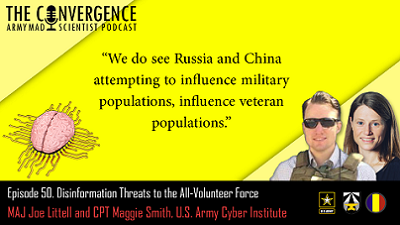[Editor’s Note: Army Mad Scientist is pleased to present our latest episode of The Convergence podcast, featuring MAJ Joe Littell and CPT Maggie Smith from the Army Cyber Institute, United States Military Academy, West Point, discussing the impact of information operations on recruitment, retention, and overall force readiness, and how we can gain information advantage over our adversaries — Enjoy!]
[If the podcast dashboard is not rendering correctly for you, please click here to listen to the podcast.]
 MAJ Joe Littell is a U.S. Army officer and researcher assigned to the Army Cyber Institute at the United States Military Academy. He has been an instructor in the Math and History departments, teaching statistics and intelligence history. His research includes computational propaganda, open source intelligence, narrative warfare, de-platforming, and generative media (such as deepfakes).
MAJ Joe Littell is a U.S. Army officer and researcher assigned to the Army Cyber Institute at the United States Military Academy. He has been an instructor in the Math and History departments, teaching statistics and intelligence history. His research includes computational propaganda, open source intelligence, narrative warfare, de-platforming, and generative media (such as deepfakes).
 CPT Maggie Smith, PhD, is a U.S. Army cyber officer also assigned to the Army Cyber Institute, where she is a scientific researcher, an assistant professor in the Department of Social Sciences, and an affiliated faculty of the Modern War Institute. She is also the director of the Competition in Cyberspace Project.
CPT Maggie Smith, PhD, is a U.S. Army cyber officer also assigned to the Army Cyber Institute, where she is a scientific researcher, an assistant professor in the Department of Social Sciences, and an affiliated faculty of the Modern War Institute. She is also the director of the Competition in Cyberspace Project.
In our interview with MAJ Littell and CPT Smith, we discussed the impact of information operations on recruitment, retention, and overall force readiness, and how we can gain information advantage over our adversaries. The following bullet points highlight key insights from our interview:
-
-
- Western liberal democracies’ concept of the internet as a platform for the free exchange of ideas is not shared by Russia and China, who regularly manage the information available to their populations via their concept of “cyber sovereignty.” As a result, Russia and China have extensive experience in manipulating online information to influence both domestic and foreign populations via propaganda. The United States has not developed this skillset.
-
-
-
- While Russia and China see information operations as a critical component of every operation, the United States has yet to adopt this strategy. Consequently, the U.S. is lagging behind its peer competitors in information warfare, oftentimes considering the narrative-building component of its actions only as an afterthought.
-
-
-
- The technologies facilitating today’s social media age are not the first to impact information operations — the printing press and radio were two revolutionary technologies that have been weaponized to control public opinion. Today’s digital technologies, however, are unique in that actors can now buy data to determine what messaging will be most impactful, enabling them to precisely target groups of individuals. For example, in the run up to the 2016 Presidential election, Russia created “Blacktivist” and “Back the Badge” social media accounts to exploit and push a divisive agenda, manipulating and polarizing American citizens.
-
-
-
- Russia and China are leveraging information operations to change the U.S. population’s perceptions, targeting military and veteran populations with false narratives that America doesn’t care about its military service members. Additionally, they seek to drive wedges between Service members and Commanders with divisive rhetoric. While it is difficult to confirm a causal relationship between these efforts and the military’s inability to hit recruitment targets, our adversaries’ efforts to exploit emotional issues and radicalize both sides of an argument have proven successful in other contexts.
-
-
-
- While the Army and the Department of Defense are skilled at developing Professional Military Education (PME) programs, it is still unclear exactly what programming will provide the strongest defense against disinformation. At a minimum, programs will need to incorporate critical thinking practice at every level and diversity in units will be essential to prevent group think.
-
-
-
- Every source of information has some amount of bias, with media outlets delivering differing perspectives of the same story. Individuals with diverse life experiences view the world through diverse lenses; understanding this can help us find the truth across a plethora of media sources. Disinformation efforts capitalize on real events but push emotional narratives to the extreme. Soldiers should be taught how to evaluate the information they consume — by examining their “media diet” or critically searching for the baseline truth in pieces designed to capitalize on human emotion.
-
-
-
- We should build a cyber-resilient Army Team, to include Soldiers transitioning out of military service that are most at-risk of being targeted with disinformation. Supporting Soldiers in all aspects of their service and as they transition to new endeavors is critical to building a resilient force overall.
-
 Stay tuned to the Mad Scientist Laboratory for our next episode of The Convergence podcast — featuring our interview with Warrant Officer Class 2 Paul Barnes, British Army, discussing his article Learning the Wrong Lessons: Biases, the Rejection of History, and Single-Issue Zealotry in Modern Military Thought, featured by our colleagues at Modern War Institute; learning from historical conflicts; and fighting against “neophilia” and “presentism“.
Stay tuned to the Mad Scientist Laboratory for our next episode of The Convergence podcast — featuring our interview with Warrant Officer Class 2 Paul Barnes, British Army, discussing his article Learning the Wrong Lessons: Biases, the Rejection of History, and Single-Issue Zealotry in Modern Military Thought, featured by our colleagues at Modern War Institute; learning from historical conflicts; and fighting against “neophilia” and “presentism“.
 The Army Cyber Institute, in cooperation with the Modern War Institute and the Competition in Cyberspace Project, is conducting its Cyber Policy Challenge Essay Contest to generate new ideas and expand the dialogue within the military cyber community — for more information about this contest, click here!
The Army Cyber Institute, in cooperation with the Modern War Institute and the Competition in Cyberspace Project, is conducting its Cyber Policy Challenge Essay Contest to generate new ideas and expand the dialogue within the military cyber community — for more information about this contest, click here!
If you enjoyed this post, check out the Army Cyber Institute’s Cyber Defense Review (CDR) journal for additional thought provoking scholarly articles and essays on the strategic, operational, and tactical aspects of the cyber domain…
… as well as the following related content:
The U.S. Congress’ original Cyberspace Solarium Report from 2020 and the 2021 Annual Report on Implementation, addressing the Nation’s progress in implementing the original report’s 82 recommendations, as well as recommendations added in white papers since its release.
Virtual Intervention: People First in 2035, by LTC James Leidenberg
Veritas, Agilis, Versabilis, by Ed dos Santos, Jr.
The Future of War is Cyber! by CPT Casey Igo and CPT Christian Turley
Sub-threshold Maneuver and the Flanking of U.S. National Security, by Dr. Russell Glenn
Global Entanglement and Multi-Reality Warfare and associated podcast, with COL Stefan Banach (USA-Ret.)
China and Russia: Achieving Decision Dominance and Information Advantage by Ian Sullivan; The Exploitation of our Biases through Improved Technology by proclaimed Mad Scientist Raechel Melling; A House Divided: Microtargeting and the next Great American Threat by 1LT Carlin Keally; The Erosion of National Will – Implications for the Future Strategist by Dr. Nick Marsella; Weaponized Information: What We’ve Learned So Far…; and Insights from the Mad Scientist Weaponized Information Series of Virtual Events
U.S. Demographics, 2020-2028: Serving Generations and Service Propensity; The Inexorable Role of Demographics by proclaimed Mad Scientist Caroline Duckworth; The Future of Talent and Soldiers with MAJ Delaney Brown, CPT Jay Long, and 1LT Richard Kuzma and associated podcast ; and The Trouble with Talent: Why We’re Struggling to Recruit and Retain Our Workforce by Sarah L. Sladek
Disclaimer: The views expressed in this blog post do not necessarily reflect those of the Department of Defense, Department of the Army, Army Futures Command (AFC), or Training and Doctrine Command (TRADOC).



